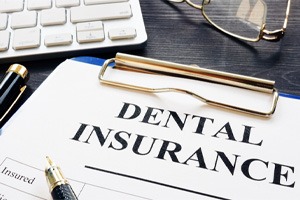
Tooth Extractions – Springfield, MO
Safe, Comfortable,
and Reliable Tooth Removal
When it comes to extracting teeth, Dr. Tolliver and his team see the procedure as a last resort. However, there are certain cases where a tooth is so damaged that it can actually cause harm to neighboring teeth, especially if an infection is present. After exhausting all options, our dental team will perform tooth extractions if the damage is likely to cause more problems for your long-term oral health. We’ll make sure that your procedure is safe every step of the way, so don’t wait to call our dental office to schedule your visit!
Why Choose Galleria Dental of Springfield for Tooth Extractions?
- State-of-the-Art Training in Oral Surgery
- Soft Tissue Laser Technology
- Calming Nitrous Oxide for Anxious Patients
Why Do Teeth Need to Be Extracted?

One of the most common reasons why teeth are extracted is because of extensive decay. When teeth become so damaged that they actually put other teeth at risk, an extraction may be the only way to effectively protect your oral health. In other cases, teeth may need to be removed if they cause other teeth to crowd or become misaligned in your smile. If you want to pursue orthodontic treatment, some teeth may need to be removed so that your remaining teeth can shift properly. Teeth can also become impacted, or trapped underneath existing teeth, increasing the risk of an infection.
Understanding the Cost of Tooth Extractions

Because every patient is unique, the cost of tooth extraction will vary significantly on a case-by-case basis. The only way to get an accurate price estimate is by attending an urgent dental care consultation with Dr. Tolliver. Rest assured – we’ll thoroughly explain the pricing information to help you know what to expect every step of the way. Not only will our team do everything possible to ensure the health of your smile, but we’ll do what we can to assist you in navigating the financial aspects of your treatment.
Factors That Can Affect Tooth Extraction Cost

During your consultation, Dr. Tolliver will perform a thorough oral examination to determine the exact cost of tooth extraction. It’s important to remember that several factors influence the overall price. Some of those include:
- The type and location of the tooth that must be extracted (i.e., incisor, molar, etc.)
- The number of teeth you’ll need to have removed
- Whether you require a simple or surgical procedure as both are very different
- Your next steps for replacing the extracted tooth (i.e., dental bridge, implant, partial or full denture)
Does Dental Insurance Cover Tooth Extractions?

Since it’s considered a major restorative procedure, you’ll be happy to know that most dental insurance plans cover around 50% of the cost of tooth extraction. Of course, the exact percentage can vary depending on whether or not your deductible has been met and how much of your yearly maximum is available. Every policy is unique, which is why you should confirm the details of your coverage with your insurance provider before committing to anything. If needed, our team is more than happy to help with that process.
Other Options for Making Tooth Extractions Affordable

Don’t have dental insurance? No problem! Our dental office offers additional financing options to help make your treatment as affordable as possible, such as:
- Dental Savings Plan – For a flat annual fee, you can enjoy the benefits of traditional insurance without the hassle of deductibles, yearly maximums, and waiting periods. Plus, you can enjoy a 10% discount on any other service we offer.
- CareCredit Financing – This option allows you to split up the total cost of your treatment into smaller monthly installments. Best of all, most payment plans come with little-to-no interest attached, helping you save even more money!
Tooth Extractions FAQs

Want to know more about tooth extractions? Our knowledgeable team has collected some common questions about tooth removal and answered them below. We hope you find this information helpful. If you still have additional questions or concerns, don’t hesitate to contact our dental office!
Does Getting a Tooth Extracted Hurt?
Don’t worry, getting a tooth removed is a smooth procedure that will not cause severe pain! As a first step, Dr. Tolliver will always numb your mouth to ensure your comfort. You can expect to experience some mild soreness and discomfort following the procedure. Carefully following aftercare instructions is essential to not only prevent infection but reduce puffiness and promote healing. If your pain worsens or you begin to exhibit signs of an infection (like a fever), then get in touch with our team right away.
What’s the Recovery for Tooth Extractions Like?
After a tooth extraction, Dr. Tolliver will provide you with a list of aftercare instructions to follow. In addition to resting, one of the most important aspects of a smooth recovery is caring for the blood clot that forms in the socket where your tooth used to be. Neglecting to do so can cause painful complications, like a dry socket. To avoid dislodging the blood clot, avoid spitting or drinking through a straw during your recovery.
It is also important to keep your mouth clean to minimize the risk of infection. Typically, you can begin rinsing with a mixture of salt and water, brushing your teeth, and flossing within three days of your procedure (but make sure to get the green light from your dentist first). Other best practices include avoiding tobacco, sticking to a soft food diet, using a cold compress to reduce swelling, and taking OTC or prescribed pain relievers as needed.
What Are My Options for Replacing a Missing Tooth?
It’s very important to replace missing teeth, both for aesthetic reasons and for your oral health. Depending on how many teeth you are getting pulled and where they are located in your mouth, there are a few different options available to you.
A dental bridge is ideal for patients who are missing one tooth or a single row of teeth. This common restoration uses adjacent teeth to anchor the replacement tooth in place. To accomplish this, a dental crown is added to the two nearest teeth, literally “bridging” the gap in your mouth.
Full and partial dentures are also popular tooth replacement options. The gum-colored base and custom-made prosthetic teeth make this restorative option more lifelike than ever before. You may consider dentures if you got multiple teeth pulled throughout your mouth or need to replace an entire arch.
Finally, dental implants are considered the superior tooth replacement option. Unlike bridges or dentures, implants replace missing teeth from the roots up. Entirely custom and incredibly durable, dental implants can last for 30+ years with proper care.
Can I Smoke After Getting a Tooth Extracted?
We strongly encourage patients to avoid tobacco products like cigars, cigarettes, and even e-cigarettes after getting a tooth removed. The suction from smoking can dislodge the protective blood clot that forms over the extraction site and delay healing. It is recommended that you abstain from smoking for at least five days afterward. However, if you can, you should avoid smoking for two weeks. If you’ve had difficulty quitting in the past, don’t hesitate to talk to Dr. Tolliver, an experienced dentist. That way, he can help you prepare in advance.